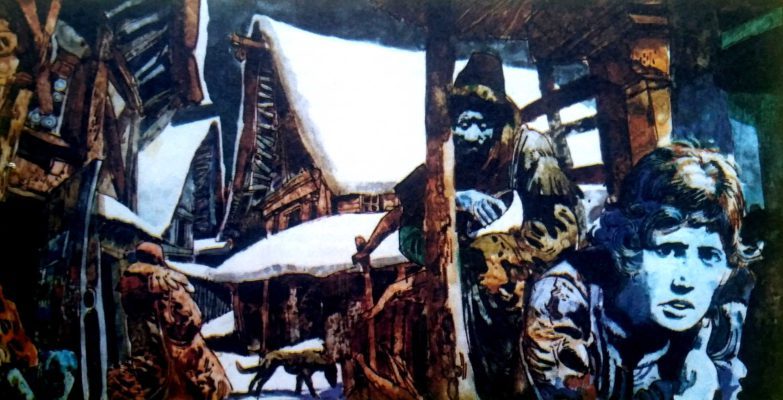
During his lifetime, Francois Villon was infamous as a criminal rather than famous as a poet, and even his name was variable. Little is known of his birth, except that it probably took place in Paris in 1431, and almost nothing is known of his parents, except that they were very poor. His own surname was either Montcorbier or de Logos and the name Villon he took from his benefactor.
The Paris in which Villon grew up was bleak and often frightening. Robbers were everywhere and famine, plague and wolves were constant companions. Many did not survive. Villon managed todo so but his view of life must have been unhappily coloured.
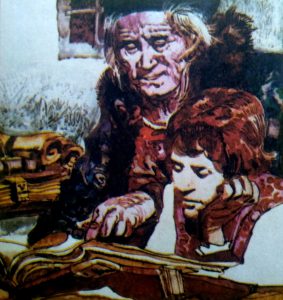
In one respect, however, Villon was lucky. Early on in his life he acquired a benefactor, Guillaume de Villon, a priest — from whom he took his name. He was probably a relative, but in those days, adoption of children by priests was common. Anyway, with his help, Francois became a student of the arts at a very early age.
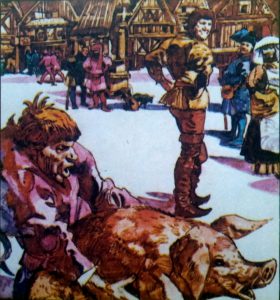
In 1449, he became a Bachelor of Arts, and in 1452 a Master. He was now spending most of his time with students in the city taverns. And, in spite of everything, he loved Paris. The squalor in a way appealed to him. When he was not gambling or drinking, he would spend hours wandering around the streets.
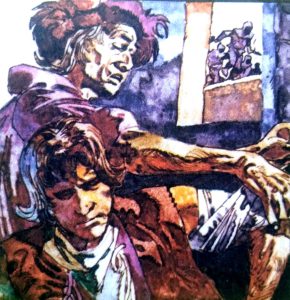
Then, in 1455, he was involved in a street fight and a priest was killed. Villon fled. He went to a barber-surgeon who dressed his wounds. But he was a wanted man and from that time seems always to have been in trouble with the law.
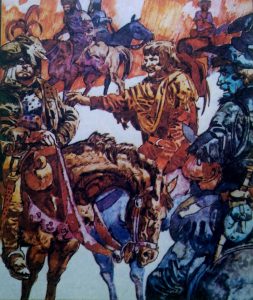
In fact, he was banished. He was lucky again, however, as in 1456, for some reason, he was pardoned. As a result he was allowed to return to Paris. Almost straight away he was in trouble again, being involved in more street fights. Then he began to associate with bands of known thieves. Nonetheless, he also composed poems — particularly the Petit Testament.
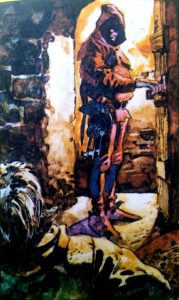
He robbed a chapel and was again banished. Perhaps not wishing to return to Paris this time, he became a wanderer. But in trouble again he was sent to prison and, later, was sentenced to death. He escaped only by an amnesty of Louis XI.
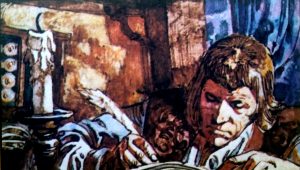
Around this time, Villon wrote the work for which he is famous—the Grand Testament. His poetry is witty and sensitive and remarkable when his life is considered. For he was again condemned to death and again banished instead. He then fades from history. He is thought to have died about 1485. Today he is still accounted one of the great world poets.

About François Villon
François Villon, the famous poet of the 15th century, became widely known not only for his remarkable literary talent but also for his scandalous lifestyle as a common thief. Born in Paris, France, around 1431, Villon was the pseudonym of François de Montcorbier, a name he adopted from his maternal family.
Villon’s early life was marked by hardship and adversity. Orphaned at a young age, he was taken under the wing of a generous benefactor who recognized his potential. He received an excellent education at the University of Paris, where he studied law, theology, and the humanities. It was during this time that Villon began to explore his passion for poetry, becoming immersed in the works of the medieval French poets such as Guillaume de Machaut and Christine de Pizan.
However, despite his promising beginnings, Villon’s life took a dramatic turn when he became involved in a violent incident. He found himself caught up in a brawl that resulted in the death of a priest. This event marked the beginning of his descent into a life of crime and vagrancy. Villon was forced into a nomadic existence, constantly evading the law and engaging in petty theft to survive.
Despite his delinquent behavior, Villon’s poetic talent remained undiminished. He continued to write prolifically, producing an extensive body of work that captured the essence of his troubled existence. His poems explored themes of love, death, and the transience of life, often imbued with a sense of melancholy and cynicism.
Villon’s most famous work, “Le Testament,” is a testament to his unique literary style, combining traditional poetic forms with colloquial language. It consists of a series of mock legal documents in which Villon bequeaths his possessions to various acquaintances, expressing his deep bitterness towards those who had mistreated him. The poem serves as a scathing critique of society and the injustices he experienced, reflecting his own sense of alienation and disillusionment.
The dual nature of Villon’s life as both a poet and a thief is reflected in his ongoing battle with the law. He was frequently arrested and imprisoned, yet his poetic genius continued to attract influential patrons who recognized the depth and power of his work. Despite his erratic lifestyle, Villon became a celebrated figure in literary circles, his verses gaining recognition for their wit and authenticity.
Villon’s criminal activities eventually caught up with him, and he was sentenced to death for his involvement in a robbery. However, his life was spared due to an unexpected intervention from the French royal court. Instead, he was banished from Paris and vanished from historical records soon after.
François Villon remains an enigmatic figure whose legacy as both a poet and a thief continues to fascinate scholars and readers alike. His ability to encapsulate the plight of the marginalized and dispossessed in his poetry remains unparalleled, cementing his place as one of the most influential poets of his time. Despite his criminal activities, Villon’s poetic genius shines through, serving as a testament to his enduring legacy.
Francois Villon's criminal activities greatly influenced his poetic work and writing style in several ways:
-
01
Personal experiences
Villon’s involvement in criminal activities and his time spent in prison gave him firsthand experiences of hardships and a different perspective on life. These experiences influenced the themes, tone, and subject matter of his poetry. Villon often wrote about the grim realities of society, the struggles of the underprivileged, and the fleeting nature of life.
CopiedPersonal experiencesVillon's involvement in criminal activities and his time spent in prison gave him firsthand experiences of hardships and a different perspective on life. These experiences influenced the themes, tone, and subject matter of his poetry. Villon often wrote about the grim realities of society, the struggles of the underprivileged, and the fleeting nature of life.
-
02
Emphasis on the marginalized
Villon’s criminal lifestyle allowed him to intimately understand and sympathize with the underprivileged, the outcasts, and the marginalized members of society. His poetry often gave voice to the lower classes, offering a glimpse into their lives, struggles, and dreams. This empathy and understanding shaped his writing style, making it more insightful and relatable to a wider audience.
CopiedEmphasis on the marginalizedVillon's criminal lifestyle allowed him to intimately understand and sympathize with the underprivileged, the outcasts, and the marginalized members of society. His poetry often gave voice to the lower classes, offering a glimpse into their lives, struggles, and dreams. This empathy and understanding shaped his writing style, making it more insightful and relatable to a wider audience.
-
03
Language and authenticity
Villon’s involvement in criminal activities exposed him to the raw and uncensored language of the streets. He incorporated this street slang, colloquialisms, and vulgarities into his poetry, breaking away from the formal and conventional literary language of his time. Villon’s use of everyday language brought a sense of realism and authenticity to his work, making it more accessible and engaging to the readers.
CopiedLanguage and authenticityVillon's involvement in criminal activities exposed him to the raw and uncensored language of the streets. He incorporated this street slang, colloquialisms, and vulgarities into his poetry, breaking away from the formal and conventional literary language of his time. Villon's use of everyday language brought a sense of realism and authenticity to his work, making it more accessible and engaging to the readers.
-
04
Expressing rebellion and defiance
Villon’s criminal activities were often acts of rebellion against the oppressive social and political system. This spirit of rebellion and defiance against authority is reflected in his poetry. Villon used his writing as a medium to criticize and challenge the norms and conventions of his time, often questioning the moral and ethical values upheld by society. His poetry became a means of expressing his antiestablishment views and advocating for social change.
CopiedExpressing rebellion and defianceVillon's criminal activities were often acts of rebellion against the oppressive social and political system. This spirit of rebellion and defiance against authority is reflected in his poetry. Villon used his writing as a medium to criticize and challenge the norms and conventions of his time, often questioning the moral and ethical values upheld by society. His poetry became a means of expressing his antiestablishment views and advocating for social change.
Francois Villon’s criminal activities not only influenced the content and themes of his poetry but also shaped his writing style, language choices, and perspectives. His experiences provided him with a unique outlook on life, allowing him to capture the essence of the struggles and realities faced by the marginalized members of society.
The theme of criminality and societal outcasts
Francois Villon, a French poet of the late 15th century, explored themes of criminality and societal outcasts throughout his most famous poems and literary works. Villon’s own tumultuous life, marked by brushes with the law and a marginalized existence, greatly influenced his poetic subject matter.
One way this theme manifests itself in Villon’s works is through his portrayal of criminals and marginalized individuals. In “Ballad of the Hanged Men,” Villon imagines himself and other criminals hanging from the gallows, giving voice to these societal outcasts. He humanizes them by depicting their shared fate and reflecting on their experiences, presenting a stark contrast to society’s perception of such individuals as mere criminals.
Furthermore, Villon’s poems often center around characters on the fringes of society, such as beggars, prostitutes, and thieves. In “Ballad of the Ladies of Olden Times,” he brings attention to forgotten or marginalized women from history. These poems serve as an indictment of the social structures that exclude and oppress these individuals, shedding light on their struggles and highlighting their humanity.
Villon’s works also explore the theme of criminality through personal confession and reflection. In “The Testament,” Villon writes a mock will in which he confesses his own misdeeds and transgressions. This poem serves as a self-portrait of a societal outcast, revealing his own criminal activities and the moral complexity of his life. Through such confessional writing, Villon humanizes himself and provides a nuanced perspective on the concept of criminality.
Villon’s use of vivid and gritty imagery helps to emphasize the theme of criminality and societal outcasts. His poems often depict gritty city streets, filthy taverns, and the dark underworld of Paris. Through these vivid descriptions, Villon paints a picture of a world filled with criminals and societal outcasts, highlighting the harsh realities faced by these individuals.
The theme of criminality and societal outcasts is deeply ingrained in Francois Villon’s most famous poems and literary works. Through his portrayal of criminals and marginalized individuals, his personal confessions, and his use of vivid imagery, Villon sheds light on the struggles faced by society’s outcasts and challenges societal norms and hierarchies.
Villon's troubled upbringing and life of crime had a significant impact on his poetry
His hardships and experiences shaped the themes and subjects addressed in his poems. Villon’s poetry often reflects a sense of melancholy, despair, and an obsession with mortality. His troubled childhood, marked by poverty, abandonment, and the death of his father, influenced his exploration of themes such as poverty, death, and the fleeting nature of life. His involvement in crime, including theft and violence, provided him with a unique perspective and an understanding of the harsh realities of society, which he frequently depicted in his work.
His criminal activities had an effect on the style and language of his poetry. Villon’s poems are often imbued with gritty and vivid details, portraying scenes of urban life, taverns, and criminal activities. His use of slang, colloquial language, and criminal jargon brings a sense of authenticity and realism to his poetry. This unconventional use of language helps to convey the gritty atmosphere of his world and the characters he encountered.
His turbulent life influenced the personal and introspective nature of his poetry. Villon’s poetry often reveals a deep sense of introspection and self-reflection, as he grapples with his own identity, his flaws, and the consequences of his actions. The experiences of poverty, rejection, and the constant threat of death forced Villon to confront his own mortality, making his poetry deeply introspective and reflective.
Villon’s troubled upbringing and life of crime deeply influenced his poetry by shaping its themes, language, and personal introspection. His unique experiences provided him with a rich source of material and a distinct perspective, contributing to the enduring impact of his work.
There are several specific events or incidents that led to Francois Villon becoming involved in thievery. Here are a few prominent ones:
After the death of his father in 1457, Villon’s mother abandoned him, leaving him without a stable family or support system. This orphanhood likely forced Villon to fend for himself and resort to criminal activities like theft for survival.
Villon attended the University of Paris, where he was known for his intelligence and poetic talents. However, he was expelled from the university for participating in a brawl or possibly stealing money from a fellow student.
Involvement with Criminal Gangs
Copied
Involvement with Criminal Gangs
Villon became associated with a group of criminals known as "coquillards." This gang was notorious for stealing, engaging in violence, and participating in other illicit activities. This association exposed Villon to a life of criminality and further motivated his involvement in thievery.
Villon became associated with a group of criminals known as "coquillards." This gang was notorious for stealing, engaging in violence, and participating in other illicit activities. This association exposed Villon to a life of criminality and further motivated his involvement in thievery.
Villon became associated with a group of criminals known as “coquillards.” This gang was notorious for stealing, engaging in violence, and participating in other illicit activities. This association exposed Villon to a life of criminality and further motivated his involvement in thievery.
Throughout his life, Villon struggled with poverty and homelessness. These circumstances likely pushed him towards theft as a means to survive and alleviate his dire financial situation.
Romantic Relationships
Copied
Romantic Relationships
Villon's involvement with women, particularly his relationships with Katherine of Vausselles and Huguette Colet, both of whom were associated with questionable characters, may have influenced his criminal activities. Love and loyalty for these women may have driven Villon to commit crimes on their behalf or to support their lifestyles.
Villon's involvement with women, particularly his relationships with Katherine of Vausselles and Huguette Colet, both of whom were associated with questionable characters, may have influenced his criminal activities. Love and loyalty for these women may have driven Villon to commit crimes on their behalf or to support their lifestyles.
Villon’s involvement with women, particularly his relationships with Katherine of Vausselles and Huguette Colet, both of whom were associated with questionable characters, may have influenced his criminal activities. Love and loyalty for these women may have driven Villon to commit crimes on their behalf or to support their lifestyles.
A combination of personal circumstances, expulsion from university, association with criminal gangs, poverty, and relationships with women involved in illicit activities contributed to Francois Villon’s involvement in thievery.
Some poems by Francois Villon
(French)
- 1. Ballade des Pendus (Ballad of the Hanged)
Aux enfants de Paris sauvage,
Corps de boue et de dureté,
Depuis votre berceau tendre âge,
C’est en souffrance qu’on vous a jetés.
Suspendus, pendus au gibet,
Tous les pécheurs, tristes et figés,
Nos corps balancent dans le vent,
Leur cri muet se perd dans le temps.
Ainsi, nous sommes là, sans vie,
Nos crimes sont gravés en nous,
Chaque visage peint notre folie,
Et chaque soupir hurle notre amour fou.
Suspendus, pendus au gibet,
Tous les pécheurs, tristes et figés,
Nos corps balancent dans le vent,
Leur cri muet se perd dans le temps.
Nos vies brèves, sans rédemption,
Ont conduit à cette triste fin,
Mais notre destin est l’abandon,
Dans la gloire de la mort, sans faim.
Suspendus, pendus au gibet,
Tous les pécheurs, tristes et figés,
Nos corps balancent dans le vent,
Leur cri muet se perd dans le temps.
(Translated in English)
- 1. Ballade of the Pendants (Ballad of the Hanged)
To the children of the wilderness of Paris,
Bodies of mud and hardness,
You’ve been thrown out in suffering since your young age.
Hanging, hanging,
All sinners, sad and sick,
Our bodies swing in the wind, their silent cry is lost in time.
So we’re here, without life,
Our crimes are engraved in us, every face paints our madness, and every sigh shouts our mad love.
Hanging, hanging, all sinners, sorrowful and weary,
Our bodies swing in the wind, their silent cry is lost in time.
Our short lives, without redemption,
Have led to this sad end, but our destiny is abandonment,
In the glory of death, without hunger.
Hanging, hanging,
All sinners, sad and sick,
Our bodies swing in the wind, their silent cry is lost in time.
(French)
- 2. Ballade des Dames du Temps Jadis (Ballad of the Ladies of Bygone Times)
Dictant souvenirs de temps anciens,
Des dames illustres et d’une beauté rare,
Leur charme envolé avec les années,
Mais leur histoire continue de nous plaire.
Il y avait Hélène, belle et enchanteresse,
Pour qui démarra la guerre de Troie,
Son visage déclencha la détresse,
Et son pouvoir de séduction nous noie.
Cléopâtre, la reine d’Égypte brillante,
Qui séduisit Jules César et son cœur,
Par l’éclat de son intelligence ardente,
Elle devint légende, telle une fleur.
Bérénice, dont l’amour était à jamais perdu,
Le Roman de la Rose raconte son épopée,
Elle croyait à un amour infini et absolu,
Mais la trahison rendit sa vie consternée.
Jeanne d’Arc, la Pucelle, avec sa force divine,
Qui mena l’armée contre les Anglais,
Son courage était tel un éclat qui illumine,
Son sacrifice est gravé, dans notre paix.
Ces dames du temps jadis nous envoutent,
Leurs histoires nous captivent, même aujourd’hui,
Leurs noms survivent et leur gloire nous émeut,
Dans nos mémoires, elles sont à jamais de vie.
(Translated in English)
- 2. Ballad of the Ladies of Time (Ballad of the Ladies of Bygone Times)
Dicting memories of ancient times,
Illustrious ladies and a rare beauty, Their charm flew with the years, But their story continues to please us.
There was Helena, beautiful and enchanting, for whom the war of Troy began,
His face has caused trouble, and his seductive power has drowned us.
Cleopatra, the brilliant queen of Egypt, who deceived Julius Caesar and his heart,
By the brightness of her ardent intelligence, she became a legend, like a flower.
Berenice, whose love was lost forever,
The Roman of the Rose tells his epic,
She believed in infinite and absolute love, but betrayal made her life perplexed.
Jeanne d’Arc, the Pucelle, with her divine power, who led the army against the English,
His courage was like a shining glow. His sacrifice is engraved in our peace.
These ladies of the time once enticed us, their stories captivated us, even today,
Their names survive and their glory stirs us,
In our memories, they are forever alive.
(French)
- 3. L’Épitaphe Villon (The Epitaph of Villon)
Un peu de terre m’est ici réservé,
Ce lopin de sol est mon dernier abri,
Le poète errant, j’ai tout traversé,
Maints larcins, chants de la vie.
Je suis François Villon, auteur maudit,
Je déclamais avec verve et fougue,
Dans les rues de Paris, j’ai grandi,
Mais ma destinée était obscure et sombre.
Ma plume a dépeint la misère humaine,
Les péchés, les vices, tout dévorait,
Dans chaque mot, une souffrance pleine,
Une âme tourmentée qui tout exprimait.
Maintenant, je repose dans ce sol froid,
Mes mots sont gravés dans l’éternité,
Ma vie chaotique, dans ces vers tordus,
Puisse-t-elle trouver enfin la liberté.
(Translated in English)
- 3. The Epitaphus Villon (The Epitaph of Villon)
A little land is reserved for me here,
This piece of ground is my last shelter,
The wandering poet, I’ve gone through everything,
Lots of chants, songs of life.
I’m François Villon, the cursed author.
I cried out with verve and fervor,
I grew up in the streets of Paris,
But my destiny was dark and dark.
My pen depicted human misery,
Sins, vices, devoured everything,
In every word, a suffering full,
A tormented soul that expressed everything.
Now I rest on this cold ground,
My words are engraved in eternity,
My chaotic life, in these twisted verses,
May she finally find freedom.
Frequently Asked Questions: Francois Villon
Francois Villon, born as Francois de Montcorbier or Francois des Loges, was a notable French poet who lived during the late 15th century. He was known for his unique and revolutionary style of poetry, which greatly influenced later generations of poets. However, Villon was also infamous for his involvement in criminal activities, particularly theft, which often took precedence over his literary pursuits.
Villon’s entry into a life of crime can be attributed partially to his tumultuous upbringing. He was orphaned at a young age and grew up in a society that offered few opportunities for individuals of lower social classes. Faced with poverty and a lack of support, Villon found solace and sustenance in the company of thieves and criminals who roamed the streets of 15th-century Paris. Over time, he became deeply involved in their activities and developed a reputation for his criminal tendencies.
Villon was primarily involved in petty theft, targeting individuals and establishments in Paris. He often resorted to pickpocketing, burglary, and stealing from both the wealthy aristocracy and the common working-class citizens. His victims ranged from unsuspecting passersby to influential figures, sometimes even evading authorities in the process. However, it is worth noting that while Villon engaged in criminal activities, his motives were often driven by survival rather than malevolence.
Yes, Villon’s criminal pursuits eventually caught up with him. He faced numerous arrests and incarcerations throughout his life. In fact, he narrowly escaped the death penalty on multiple occasions. Despite his legal troubles, Villon’s literary talent and eloquence often allowed him to gain the sympathy of influential individuals who intervened on his behalf, securing his release or reducing his sentence.
It is believed that Villon’s experiences as a thief greatly influenced the themes and content of his poetry. His verses often reflected the harsh realities of his existence, portraying the struggles and desperation of the marginalized sections of society. Villon explored themes of poverty, social inequality, and the fleeting nature of life, drawing from his own brushes with lawlessness and the consequential impact on his personal relationships.
While there is no direct evidence of remorse expressed by Villon, it is implied in some of his poetic works. He frequently conveys a sense of melancholy and regret over his actions, particularly in poems where he laments his wayward path and reflects on the consequences of his choices. These introspective verses suggest a certain level of remorse for the life of crime he led.
Villon’s criminal activities undoubtedly played a significant role in shaping his legacy. While his poetry received critical acclaim and inspired countless future writers, his life as a thief added an element of intrigue and controversy to his reputation. The dichotomy between his poetic genius and criminal inclinations has made him a unique and captivating figure in literary history, often overshadowing his contemporaries.
The perception of Villon’s criminal persona has varied throughout history. In some eras, he was celebrated as a poetic genius who transcended societal norms and defied conventions. On the other hand, he has also been condemned as an outlaw and a menace to society. However, the prevailing view today tends to appreciate the complexity of Villon’s character, recognizing that his criminal past does not diminish the artistic brilliance and lasting cultural impact of his poetry.
Villon’s poetry continues to be widely studied and admired for its lyrical beauty, inventive use of language, and profound portrayal of human struggles. His work has been translated into various languages and has left an indelible mark on the literary canon. While his criminal activities may have added an intriguing dimension to his persona, it is ultimately Villon’s poetic genius that secures his place in history as one of France’s most renowned poets.






























